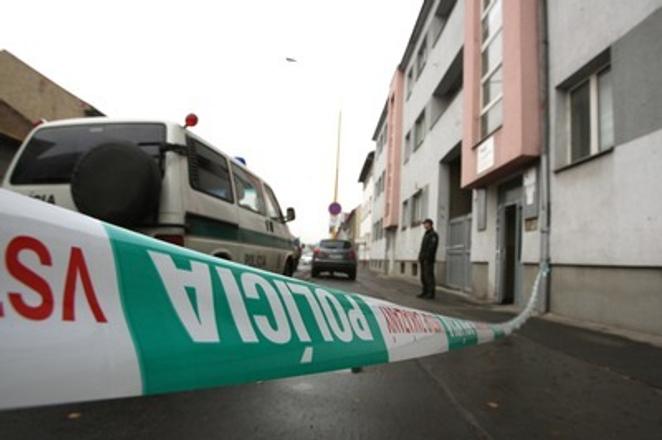“They did nothing even they knew that he was punished in the past and has a criminal record,” Robert Chocholáček, Chocholáčková’s ex-husband, wrote on his Facebook page.
Slovakia is still unable to protect women who are stalked and threatened because the whole system including police, NGOs and courts has shortcomings and loopholes, according to Sylvia Gancárová who works as a lawyer at Slniečko, a centre that aids battered women.
“It is possible that she is another victim of police procrastination,” Gancárová told The Slovak Spectator.
The crime scene
Chocholáčková was leaving her block of flats when Kiš arrived by taxi, according to police. He shot her in the head, and after Chocholáčková fell to the ground she started begging for her life because she has a small son. Kiš then shot her in the chest and stomach. After killing Chocholáčková, Kiš committed suicide. Chocholáčková's 27-year-old daughter Tereza witnessed the incident.
The National Crime Agency (NAKA) is prosecuting Kiš for assassination together with unlawful possession of firearms, trafficking arms and murder, Police Presidium spokesman Michal Slivka said.
Six criminal complaints
Slivka confirmed that Chocholáčková had filed six criminal complaints in the past. Five were against her ex-husband Robert and one was against Kiš.
“I don’t know why they are publishing them now,” Tereza told the Plus jeden deň daily. “She filed those complaints back in 2006.”
Chocholáček told the daily that in 2006 the pair went through a divorce and had many arguments, but that he never hurt her. Daughter Tereza agreed.
Legal loopholes
When aggressor is not living with the victim threatened, a woman can file a criminal complaint for dangerous stalking. Then she can ask for a restraining order to prevent the stalker from approaching her. However, without having strong proof police rarely grant them, according to Gancárová.
“Even women feel terrible anxiety and fear because they know how insidious the stalker is, it doesn’t seem so real during filling of criminal complaint,” Gancárová said.

Such situations could be solved by new legislation giving the victim a possibility to ask for help even when there is not strong proof. The police would have to deal with the case and investigate whether this protection is appropriate, according to Gancárová.
More police officers
Security has become one of the main issues in the election campaign by the ruling Smer party, with billboards saying “We are protecting Slovakia” placed all around the country. The government increased the number of police officers by 2,500 in December together with new gear and weapons.
The higher number of police officers could be useful because many local police stations suffer from lack of officers and are unable to regularly check on women who need protection. But just the higher number of people in police ranks is not enough, according to Gancárová.
“Higher number of unprofessional and uneducated police officers running on the streets does not improve the fight against domestic violence,” Gancárová said.
Moreover, Smer still counts Vladimír Jánoš among its members even after a court accepted charges for physical and mental abuse of his now ex-wife.
The party does not want to say whether it considering his expulsion. After the scandal leaked in March, Jánoš resigned his chair in parliament and his function of Prievidza district Smer leader. However, he remains a party member.

NGOs lack funds
After several murders of women drew widespread media attention in recent years, NGOs launched several hot lines. They provide people with basic information and give them contact information for the closest NGO that can help deal with abuse. They, however, are often underfunded and not able to serve an increased number of clients.
The Slniečko centre's safehouse for abused women is the only one in Slovakia which fulfils European standards for such a facility. Despite its leading position in Slovakia it too lacks funds.
Like most NGOs, Slniečko runs on the project system funded by state. Those projects are temporary and sometimes cannot be prolonged. Therefore there are months where employees are working without being sure that they will be paid. The state should create a system of permanent funding for such organisations, according to Slniečko Director Mariana Kováčová.
“You cannot tell abused women that you will stop providing her advocacy during trial just because the project is finished,” Gancárová said.



 (source: Sme )
(source: Sme )